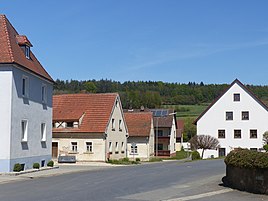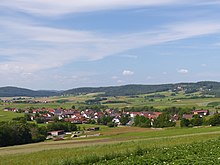Korzendorf
|
Korzendorf
Ahorntal municipality
Coordinates: 49 ° 51 ′ 47 " N , 11 ° 26 ′ 43" E
|
|
|---|---|
| Height : | 427 (420-439) m above sea level NHN |
| Residents : | 268 (1987) |
| Incorporation : | 1972 |
| Postal code : | 95491 |
| Area code : | 09279 |
|
The Ahorntaler district of Körzendorf
|
|
Körzendorf is a Franconian village that belongs to the municipality of Ahorntal .
geography
The village in the north-eastern part of Franconian Switzerland is one of 27 officially named parts of the municipality of Ahorntal in the south-eastern part of Upper Franconia . The at an altitude of 427 m above sea level. NHN located place is about four and a half kilometers away from the south-west lying Kirchahorn , in which the Ahorntaler municipal administration has its seat.
history
Up until the beginning of the 19th century, Körzendorf was under the sovereignty of the Bamberg Monastery. The dominant village and community rulership in the Franconian region was exercised by its Waischenfeld office in its function as bailiwick office . This office was also entitled to jurisdiction , in its role as a central office . When the Bamberg Monastery was secularized as a result of the Reichsdeputationshauptschluss 1802/03 and annexed by the Electorate Palatinate-Baiern in breach of the Imperial Constitution , Körzendorf became part of the New Bavarian territories that were taken over by the "Napoleonic land consolidation" , which was not until July 1806 with the The Rhine Confederation Act was subsequently legalized.
As a result of the administrative reforms in the Kingdom of Bavaria at the beginning of the 19th century, Körzendorf became a rural community with the Second Community Edict in 1818 , to which the two villages Hintergereuth and Vordergereuth as well as the desert Hütten belonged. In the course of the municipal territorial reform in Bavaria in the 1970s, the municipality of Körzendorf became part of the newly formed municipality of Ahorntal on January 1, 1972. In 1987 Körzendorf had 268 inhabitants.
traffic
The connection to the road network takes place via a communal connection road from the west of the St 2185 , which turns off near the center of the village to the south-south-west and leads to Reizendorf . The local public transport serves the village at a bus stop of the 396 bus of the VGN . The quickest train stations are in Creußen , Schnabelwaid and Pegnitz . The next long-distance train station is the main train station in Bayreuth .
literature
- Johann Kaspar Bundschuh : Körzendorf . In: Geographical Statistical-Topographical Lexicon of Franconia . tape 3 : I-Ne . Verlag der Stettinische Buchhandlung, Ulm 1801, DNB 790364301 , OCLC 833753092 , Sp. 191 ( digitized version ).
- Herbert Popp , Klaus Bitzer, Halk Thomas Porada: Franconian Switzerland . Ed .: Sebastian Lentz , Bernhard Müller (= Landscapes in Germany ). Böhlau Verlag, Vienna, Cologne, Weimar 2019, ISBN 978-3-412-51535-5 .
- Gertrud Diepolder : Bavarian History Atlas . Ed .: Max Spindler . Bayerischer Schulbuch Verlag, Munich 1969, ISBN 3-7627-0723-5 .
- Federal Statistical Office (Hrsg.): Historical municipality register for the Federal Republic of Germany. Name, border and key number changes in municipalities, counties and administrative districts from May 27, 1970 to December 31, 1982 . W. Kohlhammer, Stuttgart / Mainz 1983, ISBN 3-17-003263-1 .
Web links
- Körzendorf in the Topographia Franconiae of the University of Würzburg , accessed on June 29, 2020.
- Körzendorf in the Bavarian Authority Directory , accessed on June 29, 2020
- Körzendorf in the BayernAtlas , accessed on June 29, 2020
- Körzendorf on a historical map , accessed on June 29, 2020
Individual evidence
- ↑ a b Bavarian State Office for Statistics and Data Processing (Ed.): Official local directory for Bavaria, territorial status: May 25, 1987 . Issue 450 of the articles on Bavaria's statistics. Munich November 1991, DNB 94240937X , p. 292 ( digitized version ). Retrieved June 29, 2020
- ^ Körzendorf in the local database of the Bavarian State Library Online . Bayerische Staatsbibliothek, accessed on June 29, 2020.
- ↑ Geographical location of Körzendorf in the BayernAtlas , accessed on June 29, 2020
- ↑ Gertrud Diepolder : Bavarian History Atlas . Ed .: Max Spindler . Bayerischer Schulbuch Verlag, Munich 1969, ISBN 3-7627-0723-5 , p. 31 .
- ↑ Gertrud Diepolder : Bavarian History Atlas . Ed .: Max Spindler . Bayerischer Schulbuch Verlag, Munich 1969, ISBN 3-7627-0723-5 , p. 97-103 .
- ↑ Franconian Switzerland . In: Landscapes in Germany . S. 66 .
- ^ Johann Kaspar Bundschuh : Körzendorf . In: Geographical Statistical-Topographical Lexicon of Franconia . tape 3 : I-Ne . Verlag der Stettinische Buchhandlung, Ulm 1801, DNB 790364301 , OCLC 833753092 , Sp. 191 ( digitized version ).
- ↑ Gertrud Diepolder : Bavarian History Atlas . Ed .: Max Spindler . Bayerischer Schulbuch Verlag, Munich 1969, ISBN 3-7627-0723-5 , p. 35 .
- ↑ Gertrud Diepolder : Bavarian History Atlas . Ed .: Max Spindler . Bayerischer Schulbuch Verlag, Munich 1969, ISBN 3-7627-0723-5 , p. 106-107 .
- ^ Federal Statistical Office (ed.): Historical municipality directory for the Federal Republic of Germany. Name, border and key number changes in municipalities, counties and administrative districts from May 27, 1970 to December 31, 1982 . W. Kohlhammer, Stuttgart / Mainz 1983, ISBN 3-17-003263-1 , p. 697 .


